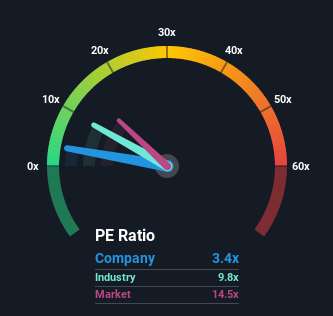- Bulgaria
- /
- Diversified Financial
- /
- BUL:DUH
Doverie United Holding AD (BUL:DUH) Might Not Be As Mispriced As It Looks After Plunging 26%

To the annoyance of some shareholders, Doverie United Holding AD (BUL:DUH) shares are down a considerable 26% in the last month, which continues a horrid run for the company. Looking at the bigger picture, even after this poor month the stock is up 59% in the last year.
Since its price has dipped substantially, given close to half the companies in Bulgaria have price-to-earnings ratios (or "P/E's") above 15x, you may consider Doverie United Holding AD as a highly attractive investment with its 3.4x P/E ratio. Although, it's not wise to just take the P/E at face value as there may be an explanation why it's so limited.
Doverie United Holding AD certainly has been doing a great job lately as it's been growing earnings at a really rapid pace. It might be that many expect the strong earnings performance to degrade substantially, which has repressed the P/E. If you like the company, you'd be hoping this isn't the case so that you could potentially pick up some stock while it's out of favour.
View our latest analysis for Doverie United Holding AD

Does Growth Match The Low P/E?
There's an inherent assumption that a company should far underperform the market for P/E ratios like Doverie United Holding AD's to be considered reasonable.
Retrospectively, the last year delivered an exceptional 103% gain to the company's bottom line. Pleasingly, EPS has also lifted 1,969% in aggregate from three years ago, thanks to the last 12 months of growth. So we can start by confirming that the company has done a great job of growing earnings over that time.
This is in contrast to the rest of the market, which is expected to grow by 15% over the next year, materially lower than the company's recent medium-term annualised growth rates.
In light of this, it's peculiar that Doverie United Holding AD's P/E sits below the majority of other companies. It looks like most investors are not convinced the company can maintain its recent growth rates.
What We Can Learn From Doverie United Holding AD's P/E?
Shares in Doverie United Holding AD have plummeted and its P/E is now low enough to touch the ground. It's argued the price-to-earnings ratio is an inferior measure of value within certain industries, but it can be a powerful business sentiment indicator.
Our examination of Doverie United Holding AD revealed its three-year earnings trends aren't contributing to its P/E anywhere near as much as we would have predicted, given they look better than current market expectations. There could be some major unobserved threats to earnings preventing the P/E ratio from matching this positive performance. At least price risks look to be very low if recent medium-term earnings trends continue, but investors seem to think future earnings could see a lot of volatility.
Don't forget that there may be other risks. For instance, we've identified 3 warning signs for Doverie United Holding AD that you should be aware of.
Of course, you might find a fantastic investment by looking at a few good candidates. So take a peek at this free list of companies with a strong growth track record, trading on a P/E below 20x.
New: Manage All Your Stock Portfolios in One Place
We've created the ultimate portfolio companion for stock investors, and it's free.
• Connect an unlimited number of Portfolios and see your total in one currency
• Be alerted to new Warning Signs or Risks via email or mobile
• Track the Fair Value of your stocks
Have feedback on this article? Concerned about the content? Get in touch with us directly. Alternatively, email editorial-team (at) simplywallst.com.
This article by Simply Wall St is general in nature. We provide commentary based on historical data and analyst forecasts only using an unbiased methodology and our articles are not intended to be financial advice. It does not constitute a recommendation to buy or sell any stock, and does not take account of your objectives, or your financial situation. We aim to bring you long-term focused analysis driven by fundamental data. Note that our analysis may not factor in the latest price-sensitive company announcements or qualitative material. Simply Wall St has no position in any stocks mentioned.
About BUL:DUH
Doverie United Holding AD
Acquires, manages, assesses, and sells shares and shareholdings in Bulgarian and foreign companies.
Good value with adequate balance sheet.
Market Insights
Community Narratives




